History and Seerah
The Odyssey of a Forgotten Nation, The Moriscos of Spain (Pt 1)
Published

The ships were brought from all over Europe and carried that day, according to Spanish documents, around 5,300 Morriscos. They embarked on September 30th, and remained in transit until they set off on October 2nd, and after a rough trip, they arrived at the Spanish fortified military settlement in Oran (modern day Wahran in Algeria) on October 5, 1609.
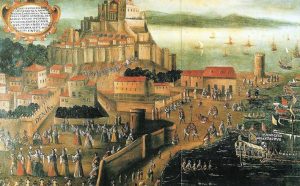
Keep supporting MuslimMatters for the sake of Allah
Alhamdulillah, we're at over 850 supporters. Help us get to 900 supporters this month. All it takes is a small gift from a reader like you to keep us going, for just $2 / month.
The Prophet (SAW) has taught us the best of deeds are those that done consistently, even if they are small. Click here to support MuslimMatters with a monthly donation of $2 per month. Set it and collect blessings from Allah (swt) for the khayr you're supporting without thinking about it.
Their odyssey started on the day when Abu Abdillah as-Saghir (Boabdil in European resources), the last governor of the last Muslim kingdom in al-Andalus, signed the capitulation of Granada in November 25, 1491 CE. and then submitted the keys of his kingdom to Ferdinand and Isabel, king and queen of Aragon and Castile, in January 2nd, 1492. The treaty was suppose to guarantee a set of rights to the Muslim inhabitants of the surrendered city, known back then as the moors; rights including religious tolerance and fair treatment in return for their unconditional surrender and submission.
The treaty contained many articles among which were the following:
- That all people should be perfectly secure in their persons, families, and properties.
- That they should be allowed to continue in their dwellings and residences, whether in the city, the suburbs, or any other part of the country.
- That their laws should be preserved as they were before, and that no-one should judge them except by those same laws.
- That their houses of worship (masajid), and the religious endowments (awqaaf) appertaining to them, should remain as they were in the times of Islam.
- That no Christian should enter the house of a Muslim, or insult him in any way.
- That all those who might choose to cross over to Africa should be allowed to take their departure within a certain time, and be conveyed in the king’s ships, and without any pecuniary tax being imposed on them, beyond the mere charge for passage.
- That the Christians who had embraced Islam should not be compelled to relinquish it and adopt their former creed.
- That no Christian should be allowed to peep over the wall, or into the house of a Muslim or enter a masjid (mosque).
- That any Muslim choosing to travel or reside among the Christians should be perfectly secure in his person and property.
- That no muadhin (one who calls for the prayers) should be interrupted in the act of calling the people to prayer, and no Muslim molested either in the performance of his daily devotions or in the observance of his fast, or in any other religious ceremony; but that if a Christian should be found laughing at them he should be punished for it.”

Inquisitor general Archbishop Cisnero of Toledo arrives in Granada in 1499 with new confrontational and intolerant policies of change and forcible conversion. His policies were, to certain limit, backed by the desire of the monarchy to create and maintain a homogenous Spanish society in both politics through ensuring people’s loyalty to the Crown, and faith by adapting Catholicism as religion. There was no doubt a policy of that kind would have dangerous and detrimental consequences, and therefore it caused the first spark of the flame, and the atrocity began.
A case of murder and its aftermath in the year 1500, lead to street fight between the Muslims in Albaicin, the Muslim quarter of Granada, and the royal authority. After few days of rioting, the crisis was contained but the damage has already been done and it became permanent; it drew great suspicion and caused great mistrust between the two groups. The original treaty was now considered breached regardless of who caused it, and the new administration became free to impose any new terms it saw fit.
As a result of this new development, the forcible conversion to Catholicism was imposed on more than 50,000 souls of the inhabitants of Granada, which was one of the most detrimental punitive punishments Cisnero was able to first achieve in his career. The Muslims were subsequently forced into hiding, and thus began the period of Crypto- and clandestine practice of Islam. This period marked the beginning of the Moriscos era in the history of Spanish Muslims. Now that they are no longer Muslims, openly at least, the terms of the original capitulation of Granada could not be applied to them and a new treaty was introduced with much more demands from the newly converted to change and assimilate into the society.
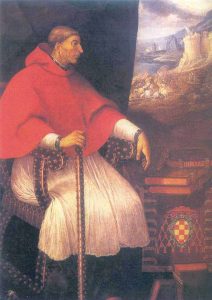
The Granadans were the original Muslims of the late kingdom of Granada, who spoke Arabic as their first language and who were not affected by the conversion followed the revolt of Albaicin. They came from different social classes and lived mainly in the former region of the kingdom of Granada. Then there were the Moriscos, the newly converted to Catholicism, but in many cases remained secretly faithful to their original religion al-Islam.
Not too long after that and in February of 1502, the forcible conversion became a state policy, and forced on all the Muslims, including the long privileged Mudajers, and the remaining Jews of Spain. Religious and civil authorities continued pursuing it throughout the century on different occasions, particularly following every revolt that took place until the last day of the expulsion.
Although the Moriscos were now considered Christians, officially at least, they have always been treated differently, particularly by the general public who always viewed them as rivals rather than fellow Christians. Even those Moriscos who tried hard to prove their good Christian character, they were never fully accepted by their fellow old Christians. In response to that attitude, the Moriscos became introversive and pushed further into clandestine lifestyle.
Despite the authorities’ effort to displace them, sending them deep into the Iberian peninsula and moving the old Christians to live amongst them, to ensure their complete merge into the society, the Moriscos continued preserving their unique identity.

1) Hijra or immigration to the heartland of the Muslim world and particularly in North Africa. This option was an opened window, at least in the first few years following the fall of Granada and during the first period of the forcible conversion, or
2) Assimilation and completely dissolving into the Castilian, Catholic society. No doubt this was the optimal option preferred by the state, or
3) Coexistence, and that is to live along the side of their fellow non-Muslim neighbors like the Mudajer did for many generations.
For the Moriscos, of all the available options, coexistence would probably have been their best option. They tried to achieve coexistence as a mean of survival, but the state’s policy aforementioned and the pressure from the religious institutions, such as the Holy Office of Inquisition, caused their efforts to go to no avail.

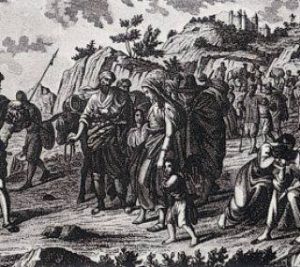
Today, what can we, as western Muslims, learn from their experience? In the rising ethnical and religious tension in the world, while living all over the earth in a culture of globalization, where traditional boundaries are no longer visible or protected, how can we avoid another odyssey from happening to the massive numbers of Muslims and non-Muslims alike?
The answer will be coming in part two.
Keep supporting MuslimMatters for the sake of Allah
Alhamdulillah, we're at over 850 supporters. Help us get to 900 supporters this month. All it takes is a small gift from a reader like you to keep us going, for just $2 / month.
The Prophet (SAW) has taught us the best of deeds are those that done consistently, even if they are small. Click here to support MuslimMatters with a monthly donation of $2 per month. Set it and collect blessings from Allah (swt) for the khayr you're supporting without thinking about it.
Sh. Yaser Birjas is originally from Palestine. He received his Bachelors degree from Islamic University of Madinah in 1996 in Fiqh & Usool, graduating as the class valedictorian. After graduating, he went on to work as a youth counselor and relief program aide in war-torn Bosnia. Thereafter, he immigrated to the U.S. and currently resides in Dallas, Texas. He is also an instructor at AlMaghrib Institute, where he teaches popular seminars such as Fiqh of Love, The Code Evolved, and Heavenly Hues. He is currently serving as an Imam at Valley Ranch Islamic Center, Irving, Texas. Sh. Yaser continues to enhance his knowledge in various arenas and most recently obtained a Masters of Adult Education and Training from the University of Phoenix, Class of 2013. In addition to his responsibilities as an Imam, Sh. Yaser is a father of four children, he’s an instructor at AlMaghrib Institute, and a national speaker appearing at many conventions and conferences around the country. He is very popular for his classes and workshops covering a wide range of topics related to the youth, marriage, parenting and family life among other social matters related to the Muslim community. His counseling services, in office and online, include providing pre-marital training, marriage coaching and conflict resolution for Muslims living in the West.


Who Am I Really? What Surat Al-‘Asr Teaches Muslim Teens About Identity | Night 1 with the Qur’an

What Would the Price Have Been for Not Drawing the Line? A Response to Imam Dawud Walid and Zainab bint Younus

Ramadan In The Quiet Moments: The Spiritual Power Of What We Don’t Do

30 Nights with the Qur’an: A Ramadan Series for Muslim Teens

Keep Zakat Sacred: A Right Of The Poor, Not A Political Tool

[Podcast] Should Muslims Ally with Conservatives or Progressives? | Imam Dawud Walid

How to Make this Ramadan Epic | Shaykh Muhammad Alshareef

[Podcast] The Parts of Being an Imam They Don’t Warn You About | Sh Mohammad Elshinawy

[Podcast] Guardians of the Tradition: Muslim Women & Islamic Education | Anse Tamara Gray

Iron Principle Under Pressure: A Profile Of Naledi Pandor

Who Am I Really? What Surat Al-‘Asr Teaches Muslim Teens About Identity | Night 1 with the Qur’an

[Podcast] Guardians of the Tradition: Muslim Women & Islamic Education | Anse Tamara Gray

How to Make this Ramadan Epic | Shaykh Muhammad Alshareef

[Dhul Hijjah Series] Calling Upon the Divine: The Art of Du’a (Part 1)

IOK Ramadan 2025: Four Steps | Sh Zaid Khan
MuslimMatters NewsLetter in Your Inbox
Sign up below to get started
Trending
-
#Current Affairs4 weeks ago
[Podcast] Should Muslims Ally with Conservatives or Progressives? | Imam Dawud Walid
-
#Current Affairs1 month ago
Op-Ed: From Pakistan To Gaza – Why Senator Mushtaq Ahmad Khan Terrifies Power And Zionism
-
#Islam3 weeks ago
How to Make this Ramadan Epic | Shaykh Muhammad Alshareef
-
#Life3 weeks ago
[Podcast] The Parts of Being an Imam They Don’t Warn You About | Sh Mohammad Elshinawy
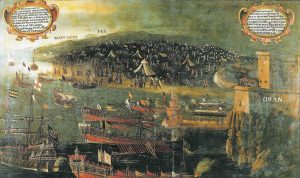
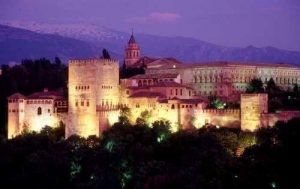
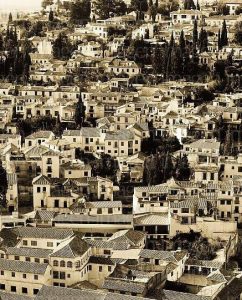








BrownS
October 26, 2009 at 1:20 AM
I’ve always found this chapter of Muslim history fascinating and suspected there were a number of lessons Muslims today could derive from them. Jazakallahu khair for presenting these to us in a digestible format :)
In one of Golwalkar’s books (one of the far right Hindu RSS founders in India), he references the Spanish model of expulsion of Muslims as a strategy they could learn from in achieving their hateful goals.
Also, yaa shaykhuna, we’re waiting for the second part of your previous series, on the problem with the economic system! May Allah bless and reward you.
nexuses
October 26, 2009 at 3:46 AM
First thing that came to my mind as well; what can we, as western Muslims, learn from their experience?
Yet, the other thing that then pops up in my mind is the verse in the Quraan that says: And they will never be satisfied with you even if you become a christian or jew (can be wrong, but this at lease thats how I remember it).
Even though I want to strive to do good for my family and society, participation doesn’t seem to be enough, even for the Mudejars. So what other/additional options are there for an healthy muslimcommunity in a largly western society where the none practicing/less orthodox muslims aren’t just that-one-good-muslim-every-none-muslim-knows i.e. who does shake hands with the opposite sex, has heard of gillette and isn’t oppressed by her father or brother?
offtopic:
Oh just recently I attended a LUCIS conference at Leiden University and the main topic was basically how the studies of academics can influence public opinion (because it is lacking). And one of the people invited had broad up, quite emotionally, “that islam is the problem behind forced marriages“. Then one of the professors/speakers corrected him and said that this was even forbidden by islamic law and I remember feeling happy that that point was addressed, but why does islam need to defend itself time and time again? What is there to feel happy about? Quite ironically, such comments are the reason d’etre of LUCIS (more or less).
Anywho, this was my first comment on this site and a lot of things came to my mind :-) of which much I had to refrain from saying :-D Hope to see more articles such as these, but also ones that pertain to contemporary issues such as beatboxing <_<
I also want to thank Yasir Birjas for putting these facts out there (as I oftentimes am too lazy to go to the library myself)
And of course one has to give respect where respect is due; jazakaAllah khair Yasir Qadhi for initiating MM and of course everybody that has helped make this possible)
Saqib
October 27, 2009 at 1:02 AM
”and the jew and christians will never be satisfied with you until you follow their religion…”
cant beleive nobody spotted that!! yes, they will never be pleased with us until we truly follow their religion, we can be their stooges all we want…
firoz85
October 26, 2009 at 5:51 AM
wow informative ! JazakAllah . Might I also add that there are moors who arrived in srilanka as well and gave lineage to todays srilankan muslim population(such as myself). http://en.wikipedia.org/wiki/Sri_Lankan_Moors
BintKhalil
October 28, 2009 at 1:55 PM
Jazak Allah Khair for that – I had no idea!
Askia Toure
October 26, 2009 at 6:16 AM
I recommend reading Muslims in American History: A Forgotten Legacy by Jerald F. Dirks. Using many documented sources, he has compiled a short history of many groups of Muslims who’ve emigrated to the Americas since the times before Columbus to the present day.
abu abdAllah Tariq Ahmed
October 26, 2009 at 7:41 AM
Jazak Allah khayr, Shaykh Yaser for this great article. :) I know it must have involved much research, so please add a bibliography or set of footnotes in the upcoming posts.
MR
October 26, 2009 at 1:57 PM
They need a movie (not a documentary) about Islam in Spain so the wider audience can learn the history of Islam there.
iMuslim
October 27, 2009 at 5:57 AM
True say. An epic produced/directed by Ridley Scott? Or his Muslim equivalent, if needs be. :)
Nahyan
October 26, 2009 at 5:13 PM
jazakallahukhair shaykh
ASAWB
October 26, 2009 at 7:26 PM
This reminds me of Ilm Summit 2008….
Rana06
October 26, 2009 at 8:54 PM
Jazakum Allahu Khairan Shaykhana HafithakaAllah for a much needed article. Very insightful and informative. SubhanAllah it’s really painful to read this part of the Andalucian history. When I was in Granada this past summer and visited Albacin, it was so painful to just walk in the streets of Albaicin. Albaicin is the only part of Granada that was perserved since the Muslims rule, the Realejo (mainly jewish section) and the other parts were reconstructed and modernized. One really travels back in time when you see the white houses with courtyards, the stone pathways and the majestic Alhambra. Thank you for sharing the knowledge and giving us a concise, historical account of the events. BarakahAllahu Feek.
A book that details the fall of Granada is ‘In the shade of the Pomegrante Tree” by Tariq Ali. It is a novel about a wealthy Moorish family and the experiences they went through during the fall of Granada. There are some parts of the book that are a bit inappropriate but overall its an emotional roller coaster.
Rana06
October 26, 2009 at 8:55 PM
By the way, is there still an Andalus AlMaghrib class in the making??
U-ssef
October 26, 2009 at 9:20 PM
Barak allaho fik for this article and the very well narration.
Just wanted to add that indeed in the beginning there where some kind of free choice and respect concerning deportation of muslim and jews to Africa, but rapidly they were forced to do so. Their wealth and possession were taken from them. Also it’s narrated that many ships who wanted to save some cost stopped in the middle of the Mediterranean sea and throw out the passenger.
And you’re right what’s important is to stop those things before it happens again, I remember that we had the same kind of debate in France after the law that banned Hijab in schools. Because between the first laws that were proclaimed in Spain at those times are some against muslim woman liberty, they were forced to wear more catholics clothes.
iMuslim
October 27, 2009 at 5:54 AM
I think it is also an important lesson for Muslim countries, on how to treat their non-Muslim minorities. It’s universal law that “what goes around, comes around”. Similar words have been spoken by many wiser people, such as Umar, radiallahu anhu, I believe, when he advised his army that the only thing that would permit them victory was that if their sins were less than those of the opposition. I.e., simply being believers was not enough.
Therefore we need to think more widely than how we want our own rights to be protected in non-Muslim lands: when we start protecting the rights of others – including non-Muslims – Allah will ensure our own safety. I think the Qur’an, Sunnah, and history in general testifies to that.
Unique Spain
October 27, 2009 at 6:18 AM
A great read!
Whilst most tend to focus on the south of Spain when they remember or talk about Al Andalus the North of Spain and the catholic stonghold of Zaragoza was also part of the empire. This is the pyrennes and almost southern France that we’re talking about.
Most visitors to Spain love the Alhabra in Granada and the mezquita in Cordoba but if you do visit the north then I have to recomend the following as a brief overview of some of the important contributions to the culture http://www.uniquespain.com/moorish-zaragoza.html
Rana06
October 27, 2009 at 7:56 AM
Thanks for the insight!!! That’s amazing, the influence of the Moros was so widespread SubhanAllah.
Unique Spain
October 27, 2009 at 1:35 PM
The influence continues in Modern day Spain and Spanish.
For example a Calendar in Spanish is Calendario but older people in the south will call it an Almance (not sure on the spelling, apologies). Another example is surnames, for example the surname Albarran is derived from Arabic.
Its there if one chooses to look and if one knows what one is looking for but, alas, like most things in this world people walk around in ignorrance.
PS: I’m not Muslim or religious in any way. Just believe that each has to find their own enlightenment and to do so one has to have both the mind and soul open.
Rana06
October 27, 2009 at 10:13 PM
Thanks for the information. The reason I made my comment was because as a major in Spanish, I studied the history of Spain (not as extensively as I would like) and am familiar with the Moorish influence. This past summer I studied in Andalucia, specifically Granada and visited many of the sights in Southern Spain with Moorish influence. However, like you said in your initial comment, I never even thought to look past the autonomous community of Andalucia. Now that you bring it to my attention I would like to investigate the influence in Zaragoza and other Northern communities. Again I thank you for opening my eyes to study more the Northern influence.
And I wholeheartedly agree with you that we each have to keep our mind open, find our enlightment and educate ourselves. For today’s problems stem out of ignorace.
Les Herasymchuk
October 27, 2009 at 6:23 AM
To my mind, the world is going through a period of aggravating religious and ethnic oppositions. The best way out might be creation of a sort of a Global Commission on religious matters intended to settle the disputes on the ground of theological consensus etc. These kinds of disputes cannot be solved politically, e.g. by UN, because the very instruments of UN are politically motivated, while religious disputes deal with terminological and interpretative grounds, which should be explained and dealt with in the first place.
Rana06
October 27, 2009 at 7:55 AM
But many times religions are backed by governments or political institutions…so in the end the commission will have to deal with religious problems with political ties.
Ibn Malik
October 27, 2009 at 8:56 AM
MashaAllah!
TabarakAllah!
Perfect
Ilmpath Academy (in Toronto) has a course coming up solely on Andalus
The history of spain! 1 full weekend of history! SubhanAllah cant wait!
Rana06
October 27, 2009 at 11:40 AM
When???
Ibn AbuAisha
October 28, 2009 at 1:37 AM
Assalamu Alaikum,
BarakAllahu Feekum Ya Shaykhana for the enlightening article. SubhanAllah, as ASAWB said above, it truly brought back so many memories of IlmSummit 2008.
@ Sister Rana06, the class offered by Ilm Path Academy on the History of Andalus will Insha Allah take place from Jan. 23-24 in Toronto. You can find more information here http://bit.ly/1ijVC7 Masha Allah the Shaykh is a really good instructor, he also teaches courses for AlKauthar Institute. We concluded Ilm Path’s first seminar titled Fiqh of Death this past weekend.
@ Shaykh Yaser – I met an IlmSummit Brother from Chicago (whom you know very well) at Ilm Path’s seminar in Toronto. I was very happy to hear from him that you are doing very well WAlhamdulillah. May Allah preserve you and your family Ya Shaykhana.
Wassalamu Alaikum.
khalid54
October 27, 2009 at 8:06 PM
As Salaam Aleykum,
On the whole an interesting post, but I’m afraid its a little strange for a number of reasons:
1) “Soon after the suppression of the 1568-1571 revolt of the Moriscos…” I object to the usage of the very secular word ‘revolt.’ By no means was it simply a ‘revolt.’ It was a proper jihad, with emir, preparation and backing of the Uthmani Khilaafa. If you use only western research, which is based primarily on the work of Henry Charles Lea, LP Henry and Gayangos, you will probably reach an accounting of Morisco history that is very western in its outlook. And no, using Tarek Suwaidan’s illustrated history of Spain wont cut the mustard either. I think further research into the accuracy of such claims should be made before making articles public. After all, most people on this forum are probably hearing for the first time in their lives that Muslims remained in Spain after 1492. If youre interested, read Prof. Ali Montasir Al Kataani’s arabic book, “The Revival of Islam in Al Andalus” (انبعاث الإسلام بالأندلس).
2. “which synched in time with the marine battle of Lepanto, in which the Ottoman navy lost its supreme and ultimate control of the Mediterranean to Spain, Creating a power shift and a new balance in the region…”
I disagree with that too. Quite a few western scholars have come forward over the last 20 years and so and after reviewing the turkish archives and an assortment of new data have come to the conclusion that lepanto was not a decisive point in Uthmani naval history in general.
As for brothers and sisters that cant read arabic, I just finished reading through a fascinating book on this very topic called “An Incomplete History: The Muslims of Spain Post 1492 in a Global Context and its Relevance to Muslims Today” this week, (google it, or go here for a blog version: historyofandalus.wordpress.com).
As for my take on the answer Shaykh Yasir is eluding at, from what I know and what I have read, I dont see a bright future for the Muslims of the west. You would ask logically ‘why so?’
In my opinion, unless we start ‘watering’ down our deen to fit the western ‘mold,’ (i.e. the place of religion of society, separation of mosque and state/giving Caesar what is due to him, etc.). Ironically using the example of Andalus, evidence from the book named above and other studies such as Weigers “Islamic Literature in Spanish and Aljamiado,” show that the only islam that ended up surviving covertly during the stretch of time between 1492 and 1610 was the islam of the Tariqas/’sufism.’ It was manageable for the muslims due to the laxity allowed by some tariqas such as the Shadilliyah. There was nothing in their Islam they practiced that made them stand out. See the similarity today? I dont want to name names, but indeed, look at the boards of major Islamic organizations in America and their scholars. What path are they following and what are they preaching? If you said “conformity, working within the framework, tasawwuf,” then you would be right on the money. of course this doesn’t add to the equation all the efforts by the governments of the west to seem welcoming and accommodating, but behind our backs they are implementing a whole different agenda, AKA Rand and co.’s agenda of watering the Muslim Milieau down to secularists or traditionalists, (and the people theyre trying to prop up for the job, but failing miserably to do, such as Ed hussain and the Quilliam boys, Irshad Manji et al and so many more normal scholars and islamic scholars).
What about the gradual assimilation of culture that will indeed take place with our childrens generation or at least their kids? The majority culture in the west/america is not a muslim culture. Keep in mind when I say culture, I mean way of life and values, so therefore when the coming generation start assimilating more completely, they would not only lose their parents ‘syrianess’ and ‘Pakistaniness’ and all the cultural paraphanalia that comes with that but ALSO their deen.
Phew…way too much to write, so little time. just my 10 dinars at the end of the day. Im anxiously awaiting Shaikh Yasir second post.
W’salam
Holly Garza
October 28, 2009 at 9:48 AM
MashaAllah Way to go Sheik Yaser!! I like your style even more now. I have been fascinated with the story of Islam as far as the “Spain” and “Native American” Muslims go and have found some information. A very good piece on it in Early America in The Native American Community which intrigued me so much one of my first blogs was inspired by it and there are other examples of Islam spreading into Native Americans such as Muslims BEFORE Christopher Columbus click HERE ( and/or click here ) but this is by far one of the best articles I’ve seen regarding to it. :)
JazakAllahum Khayer
Stinger
November 6, 2009 at 12:57 AM
Great article, I’m looking forward to part two and suggestions on how to prevent history from repeating itself, Inshallah.
hUddi
November 26, 2009 at 7:07 AM
JK
Sergio
March 6, 2010 at 4:02 PM
Has anyone read Blood and Faith, a book about the expulsion of the Moriscos? I saw the book once, but I was wondering what those who have read it think. It came out in 2009. I forget the author’s name.
Morad
March 14, 2010 at 2:38 PM
Assalam u 3alaikum
Mashaallah…Currently I am working on a term paper with the topic of Al-Andalus. I put my focus here on the Andalusian School of Agronomy and the associated high development of agriculture.
The treat the “Moriscos” too.
Among others I analyse the effects on the agriculture after the expulsion of the moriscos on the Iberian Peninsula. The moriscos had the knowledge and the high quality systems.
Unfortunately, the seminar paper is in German. Otherwise, I would like to contribute and send you this work.
May Allah ta3ala give us the same motivation to become a Umma of knowledge. Amin
Wua salam
PS: Excuse my spelling and my grammar mistakes – I’m from Germany and is a bit difficult for me to write in english. :)
Morad
March 14, 2010 at 3:00 PM
@Sergio
The author from Blood and Faith is Matthew Carr
Sergio
March 16, 2010 at 1:06 AM
Thanks, Morad. Have you read the book?
Noura
August 26, 2010 at 4:33 PM
hello am originally from city in andalusia named sonkoria and my grandfather named by arab by sonkor he left andalusia and lived in lebia
but i dream to come back to andalusia and live there
my grandfather was muslem spanish old hero there very famous within muslems in theses agaes
if anybody kws anyth about this topic can help me
i want to take back nationality oneday i dnt kw if i can do or not …
Lakita Mervin
February 6, 2011 at 10:52 AM
This really is a very worthwhile website and a useful information resource. If perhaps you are ever thinking about Tenerife property and visit the island, then please do visit our offices.
Doloris Pillers
February 6, 2011 at 11:33 AM
I have shared a bookmark to your blog so that anyone else interested in property can find it. We’d love to meet you, if you ever plan to come to Tenerife. Tenerife Property CBS S.L. C/. Londres, CC Fañabe Plaza 129, Playa Fañabe, 38660 Adeje, Spain +34 922 71 47 72
tk20
February 14, 2013 at 11:22 PM
asalmualiakum. WHERE’S PART TWO?!?!
aik
April 11, 2013 at 2:39 AM
Thank you for sharing some very good information (khalid 54), and all the others. I have read the book by Tariq Ali the book by Charles Lee abt the Moriscos of Spain. Both are heartbreaking.
I am also waiting for part 2 of this fantastic article :)
and it is my wish/dream to someday to visit Spain, to visit the great Alhambra, Qurtaba’s jamiah Masjid and other muslim historical sites
Ehsan Butt
November 9, 2013 at 10:38 AM
History, European in particular, as it is now is a collection of literature produced for different objectives mostly to use it or abuse for some personal or group interests. The best way to find truth is to forensically find primary, info that is kind of self evident testimony, and build your case and not totally depend on forged historical literary quotations. See an example of such fact finding effort:
European Huguenots and Anabaptist Were Muslims
http://advancingrationalfaith.blogspot.ca/p/huguenots-anabaptists-were-they-muslims.html
http://historicityofreligioustexts.blogspot.ca/
http://advancingrationalfaith.blogspot.ca/
Gundemar Rex
May 1, 2015 at 2:29 PM
When your religion invaded the Western Roman Province of Hispania, then under Visigoth Rule, it had no respect for its culture and inhabitants. Your religion has no respect for the native nations that it invades and was rightly expelled from the glorious province, land of Celts and Iberians, LATER of Vandals. Even your name of the province ‘al-Andalus’ acknowledges that it was land of Vandals. It wasn’t. Vandals, like Suebi, like Goths, etc came in from Eastern and Northern Europe. They took up the far superior Roman legal system and contributed positively to the land. The language of Spain was Latin (since Hannibal’s arse was solemnly kicked by P. Cornelius Scipio). Latin became the lingua franca of the peninsula, a dialect of Latin (‘spanish’) is the lingua franca of the peninsula today. Trajan was Spanish, Hadrian was Spanish, the Senecas were Spanish, the greatest poet M. Valerius Martialis was Spanish. You and your religion are blind to anything that happened before (see the barbarism performed in the name of your religion against the Assyrians today and its monumental past!!!) You have no respect for humanity and humanism because of your bigotted fanatical piggish, yes piggish religion. (I love my pork and my ‘serrano’ ham!) So shut up and respect those who have been here before any of your crooked co-religionaries invaded and destroyed everything they could. We exist, much to your chagrin, and we are ready to reconquer anything that you mean to destroy. My advise: abandon that stupid pseudo-religion now!
Zee
December 5, 2015 at 4:58 PM
What a lovely person you seem like.. How compelled I feel to follow such a respectful human being! To you your religion, and to me mine. There is no denying that the Muslim rule of Spain saw one of the most exquisite civilisations in history, with Muslims, Jews and Christians living in peace alongside one another, riches and wealth and justice presiding. None can deny this except a liar, and one who has a deep aversion to the truth. Peace.
door Giana
March 16, 2017 at 8:14 AM
Cool..!